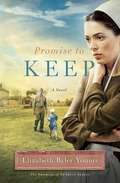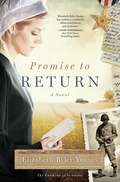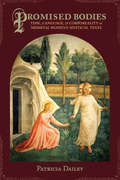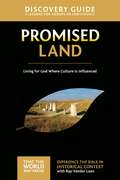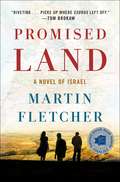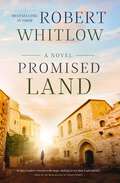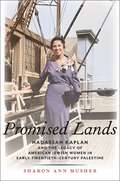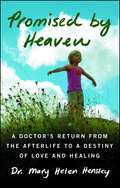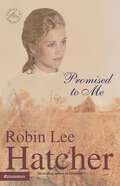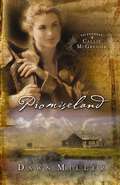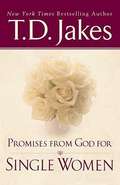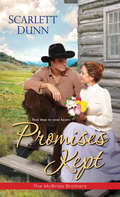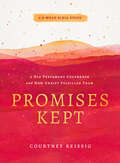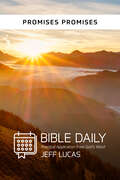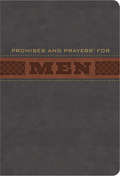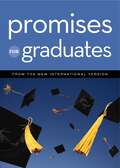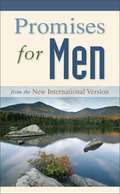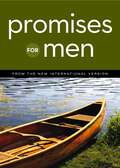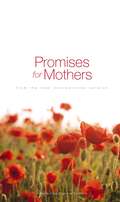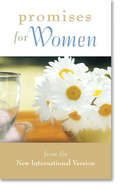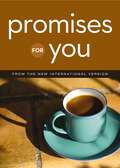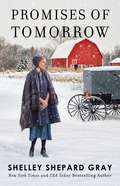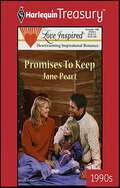- Table View
- List View
Promise to Keep: A Novel (Promise of Sunrise #3)
by Elizabeth Byler YountsWorld War II Marine Joe Garrison returns home from war longing to be a father to his deaf daughter, Daisy, only to find that she is attached to Esther Detweiler, the Amish woman who has raised her since his wife's death in this touching historical romance.Orphaned as a child, Esther Detweiler is used to caring for herself and her ailing grandmother. They made the best out of a hard life and poverty without asking for help. They even take in her shunned cousin's deaf daughter, Daisy, when her mother dies and her father goes off to war. When Esther's grandmother dies, Daisy is all she has. When war veteran Joe Garrison returns, all he can think about is recovering from the horrors of war and building a relationship with his seven-year-old daughter. Daisy, however, is unwilling to leave Esther, whom she loves. Joe and Daisy get to know each other again, but Joe struggles with nightmares and fatherhood is proving to be more difficult than he imagined. Esther loves Daisy and despite her Amish ways, Joe finds himself drawn to her as a woman and not just a caregiver. As their love blossoms, Joe decides to send Daisy away to a school for the deaf which propels their lives into turmoil and a battle for love and family.
Promise to Return
by Elizabeth Byler YountsWhen World War II breaks out, Miriam Coblentz's peaceful Amish world is turned upside down... It's 1943, and Miriam Coblentz and Henry Mast are nearing their wedding day when the unthinkable happens--Henry is drafted. However, since he is a part of the pacifist Amish tradition, Henry is sent to a conscientious objector Civilian Public Service camp. When he leaves for the work camp, his gaping absence turns Miriam's life upside down. Little does she know it's only the beginning. . . When Henry returns home, he brings news that shakes Miriam and their Amish community to the core. Henry believes God has called him to enlist in the army and fight for his country, leaving her to make an important decision: whether to choose loyalty to the peaceful life she's always known or her love for Henry. Two worlds collide in this unforgettable debut novel, providing a fascinating and rare look into Amish culture during World War II. While Henry is battling enemies across the ocean, Miriam struggles between her devotion to Henry and her love of the Amish way of life. One question is at the bottom of it all: will she follow the rules of her religion or the leading of her heart?
Promise to Return: A Novel
by Elizabeth Byler YountsWhen World War II breaks out, Miriam's fiancé, Henry, is drafted and sent to a conscientious objector camp. But when Henry feels called to fight on the front lines, he goes against the Amish church to follow God's will--forcing Miriam to choose between the rules of her religion and the leading of her heart.When World War II breaks out, Miriam Coblentz's peaceful Amish world is turned upside down... It's 1943, and Miriam Coblentz and Henry Mast are nearing their wedding day when the unthinkable happens--Henry is drafted. However, since he is a part of the pacifist Amish tradition, Henry is sent to a conscientious objector Civilian Public Service camp. When he leaves for the work camp, his gaping absence turns Miriam's life upside down. Little does she know it's only the beginning... When Henry returns home, he brings news that shakes Miriam and their Amish community to the core. Henry believes God has called him to enlist in the army and fight for his country, leaving her to make an important decision: whether to choose loyalty to the peaceful life she's always known or her love for Henry. Two worlds collide in this unforgettable debut novel, providing a fascinating and rare look into Amish culture during World War II. While Henry is battling enemies across the ocean, Miriam struggles between her devotion to Henry and her love of the Amish way of life. One question is at the bottom of it all: will she follow the rules of her religion or the leading of her heart?
Promised Bodies: Time, Language, and Corporeality in Medieval Women's Mystical Texts (Gender, Theory, and Religion)
by Patricia DaileyIn the Christian tradition, especially in the works of Paul, Augustine, and the exegetes of the Middle Ages, the body is a twofold entity consisting of inner and outer persons that promises to find its true materiality in a time to come. A potentially transformative vehicle, it is a dynamic mirror that can reflect the work of the divine within and substantially alter its own materiality if receptive to divine grace. The writings of Hadewijch of Brabant, a thirteenth-century beguine, engage with this tradition in sophisticated ways both singular to her mysticism and indicative of the theological milieu of the twelfth and thirteenth centuries. Crossing linguistic and historical boundaries, Patricia Dailey connects the embodied poetics of Hadewijch's visions, writings, and letters to the work of Julian of Norwich, Hildegard of Bingen, Marguerite of Oingt, and other mystics and visionaries. She establishes new criteria to more consistently understand and assess the singularity of women's mystical texts and, by underscoring the similarities between men's and women's writings of the time, collapses traditional conceptions of gender as they relate to differences in style, language, interpretative practices, forms of literacy, and uses of textuality.
Promised Land Discovery Guide: Living for God Where Culture Is Influenced (That the World May Know)
by Ray Vander Laan Stephen And SorensonThis five-session small group Bible study (DVD/digital video sold separately) by noted teacher and historian, Ray Vander Laan, is volume one of the That the World May Know series. Vander Laan illustrates how God guided his people to a specific place – the Promised Land – to impact the world both in ancient times and today. Just like the time and place of our birth shapes our journey, so the land and culture of the Hebrew people shaped their story. Promised Land provides wonderful context to the stories of that time. Faith Lessons is a unique video series that brings God's Word to life with astounding relevance. By weaving together the Bible's fascinating historical, cultural, religious, and geographical contexts, teacher and historian Ray Vander Laan reveals unique insights into the Scriptures' significance for modern believers. Each lesson: Focuses on passages of Scripture explored in the DVD Includes sidebars, maps, photos and other study tools Features questions that facilitate discussion and inspire personal reflection Include 30 personal Bible studies to help you deepen your learning experience between sessions, and turn lessons from the past into applications that impact how you live out your faith today. Filmed on location in Israel, these illuminating "faith lessons" afford a new understanding of the Bible that will ground your convictions and transform your life. The Faith Lessons video series is ideal for use in small groups, personal and family Bible studies, and adult Sunday school. Individual believers and families will gain vital insights from long-ago times and cultures through this innovative approach to Bible study. Lessons include: Standing at the Crossroads –Tel Gezer Wet Feet – Jordan River First Fruits – Tel Jericho Confronting Evil – Tel Beth Shemesh Iron of Culture – Tel Azekah Designed for use with the Faith Lessons Promised Land Video Study (sold separately).
Promised Land: A Novel of Israel
by Martin Fletcher"Martin Fletcher, who headed up NBC TV’s Tel Aviv News Bureau, knows his territory and it shows on every page. Promised Land is a great sweeping epic, reminiscent of Leon Uris’ Exodus; a moving story of triumph and tragedy, new love and historic hate, expertly told by a cast of unforgettable characters. Fletcher’s writing is superb and rises to the level of importance that this story demands and deserves. Historical novels don’t get much better than Promised Land." —Nelson DeMille, #1 New York Times bestselling author of The Cuban AffairPromised Land is the sweeping saga of two brothers and the woman they love, a devastating love triangle set against the tumultuous founding of Israel.The story begins when fourteen-year-old Peter is sent west to America to escape the growing horror of Nazi Germany. But his younger brother Arie and their entire family are sent east to the death camps. Only Arie survives.The brothers reunite in the nascent Jewish state, where Arie becomes a businessman and one of the richest men in Israel while Peter becomes a top Mossad agent heading some of Israel’s most vital espionage operations. One brother builds Israel, the other protects it. But they also fall in love with the same woman, Tamara, a lonely Jewish refugee from Cairo. And over the next two decades, as their new homeland faces extraordinary obstacles that could destroy it, the brothers’ intrigues and jealousies threaten to tear their new lives apart.Promised Land is at once the gripping tale of a struggling family and an epic about a struggling nation.
Promised Land: Chosen People And Promised Land (A Chosen People Novel #2)
by Robert WhitlowWith historical mysteries, religious intrigue, and political danger, Promised Land asks one momentous question: What if your calling puts you—and your family—in the crosshairs?Despite their Israeli citizenship, Hana and Daud cannot safely return to their homeland because a dangerous terrorist ring is threatening Daud. Hana is perfectly fine remaining in the United States, working for a law firm in Atlanta, especially when she learns she&’s pregnant. But Daud can&’t shake the draw to return home to Israel, even if it makes him a walking target.Hana is helping her boss plan a huge Middle East summit in Atlanta when Jakob Brodsky, her old friend and former co-litigator, asks for her help with a case. His client is attempting to recover ancient artifacts stolen from his Jewish great-grandfather by a Soviet colonel at the end of World War II. Because the case crosses several national borders, he needs Hana&’s knowledge and skill to get to the bottom of what happened to these precious artifacts.Meanwhile, Daud is called in to help a US intelligence agency extract a Ukrainian doctor from a dangerous situation in Egypt. While overseas, he can&’t resist the call of Jerusalem and thus sets off a series of events that puts thousands of people in danger, including his wife and unborn child.Bestselling author Robert Whitlow explores the meaning of family and home—and how faith forms the identity of both—in this breathtaking sequel to Chosen People.Praise for Promised Land:&“Promised Land is a book about coming home. Of becoming settled in your spirit and your relationships. With layers of intensity, thanks to international intrigue, moments of legal wrangling, and pages of sweet relationships, this book is rich and complex. A wonderful read.&” —Cara Putman, author of Flight Risk
Promised Lands: Hadassah Kaplan and the Legacy of American Jewish Women in Early Twentieth-Century Palestine
by Sharon Ann MusherHow adventurous Jewish women’s travels upended Jewish normsIn 1922, Rabbi Mordecai Kaplan, the founder of Reconstructionist Judaism, first initiated the bat mitzvah as a rite-of-passage for Jewish girls. Characterized as a lifelong supporter of women’s rights, Kaplan’s family, including his wife and four daughters, played a role in shaping his ideas about women, culture, and Zionism. This was especially true of his second daughter, Hadassah Kaplan, who joined a small but influential cohort of American Jewish women who studied, worked, and volunteered in British Mandate Palestine.Promised Lands provides a window into the lives of American Jewish women in both New York City’s Upper West Side and Palestine during the interwar period. By tracing Hadassah’s journey, the volume offers a sense of what drew this generation of adventurous women to Palestine, and helps us to understand their impact on American Jewry. Drawing on a rich personal archive of diary entries, photographs, and letters, Sharon Ann Musher displays how unconventional women like Hadassah Kaplan were able to challenge cultural norms and experiment with ideological commitments while still remaining “good” daughters, wives, and mothers. Their knowledge and experience in volunteering, philanthropy, and education within the United States helped them to build Jewish institutions and communities abroad, and to center Zionism in American Jewish education, institutions, and identity. Crafting a compelling portrait of an influential Jewish woman, Promised Lands showcases the legacy of Hadassah Kaplan and her fellow travelers on American Jewish life.
Promised by Heaven
by Mary Helen HensleyA moving and inspirational memoir of love, loss, and renewal, Promised by Heaven tells the amazing story of how one woman's near-death experience and glimpse of heaven led her to discover her gifts of healing and share them with the world.In December of 1991, Mary Helen Hensley was involved in a car accident that changed her life forever. Upon impact, traveling at more than seventy-five miles per hour, she felt time stall and temporarily left her body. In those moments, Mary Helen was consumed with a sudden clarity. She realized she had the choice to either remain in her body or exit from the earth, allowing the remainder of the scene to unfold without feeling any pain. She chose to depart from her body--and enter heaven. In heaven, Mary Helen was welcomed by two angels who walked her through the place of light and encouraged her to go back to earth and help others. When she returned to earth, Mary Helen was suddenly struck with a desire to live a life of service and quickly set out on a journey into metaphysical healing. Her adventures took her to Ireland, where she went on to become a chiropractor, find love and new friendships, become a mother, and help numerous people with her gifts of communicating with the dead and seeing into the future. Promised by Heaven is a remarkable spiritual journey that questions everything we understand to be true. Describing in great detail her experience in heaven, meeting angels, and returning to earth a changed woman, Mary Helen Hensley offers an unforgettable account of her path to find her true calling.
Promised to Me (Coming to America #4)
by Robin Lee HatcherDear Mother and Father, After all those years, I was certain Jakob Hirsch had forgotten me. Then came his proposal of marriage. With more impulse than wisdom, I crossed the ocean to begin a new life with him in Shadow Creek, Idaho. Little did I dream of the changes eleven years had brought to the man I once loved—which included three small children waiting with him at the station. I will not marry a stranger who no longer loves me, but I have agreed to look after Jakob’s children until the harvest is in. A cabin on his property provides me with respectable living quarters. If only it were as easy to separate my heart from this family! It will be difficult to leave when the time comes, for I am falling in love with these little ones—and, truth be told, with Jakob. Your loving daughter, Karola Breit In Idaho, the land is good but life is hard for a German émigré whose dreams have turned to dust. Love found and lost can shatter a man’s faith. But it is about to strengthen that of the woman to whom he turns—and in the drought of summer, a withered promise springs to life. Promised to Me is book four in the Coming to America series about women who come to America to start new lives. Set in the late 1800s and early 1900s, these novels by best-selling author Robin Lee Hatcher craft intense chemistry and conflict between the characters, lit by a glowing faith and humanity that will win your heart. Look for other books in the series at your favorite Christian bookstore.
Promiseland: The Journal of Callie McGregor series, Book 1
by Dawn MillerPioneer woman Callie McGregor and her family are determined to survive the Indian massacres, prairie wildfires, droughts, and blizzards of the Montana territory in the 1800s with their faith intact.
Promises From God For Single Women
by T. D. JakesThe world-renowned pastor now guides single women through the joys and sorrows of life with a collection of scripture and his one one-of-a-kind wisdom.
Promises Kept (The McBride Brothers #1)
by Scarlett DunnIn this inspirational western romance series opener, a mail-order bride in search of a fresh start finds danger and a handsome cowboy.Lady of marriageable age with two young boys, in need of husband. I am a good cook and hard worker. Victoria Eastman grew up in an Abilene saloon—an experience that made her tough, resourceful, and determined to forge a new life. So, she places an ad in a western newspaper and soon finds herself a suitable arrangement on a farm in Promise, Wyoming. Only problem is that her would-be husband turns up dead the day she arrives. Rancher Colt McBride is known for his true grit and business intellect. Yet when it comes to his new neighbor, Victoria, he&’s stumped: Who is she, really? She&’s a beautiful woman and has proven herself a gentle soul. She&’s even causing him to question his staunch bachelorhood. But any kind of future may be shattered when a stranger reveals a secret about Victoria&’s past—one that could destroy them both. Unless, together, they can take a leap of faith—right into each other&’s arms . . .Praise for Scarlett Dunn and the McBride Brothers series &“Dunn is a talented author who gives fans what they expect in historical romance.&” —RT Book Reviews &“This one swept me off my feet . . . I didn&’t want it to end!&” —First for Women
Promises Kept: 5 Old Testament Covenants and How Christ Fulfilled Them (6-Week Bible Study)
by Courtney ReissigA covenant is a bond. A promise. A token of abiding love. Promises ground us. With every promise comes stability and beauty. Every kept vow gives courage and hope. In Promises Kept, passionate and gifted Bible teacher Courtney Reissig takes students through five Old Testament covenants—promises—with the goal of seeing God&’s beautiful storyline.What are the purposes of God&’s covenants and how do they inform and transform the way we live? During these six weeks, we discover the meaning of God&’s Covenant with Adam, Abraham, the Exodus and Passover, the Mosaic Covenant, God&’s Covenant with David, and the New Covenant Promised. Participants see God&’s purposes for His people, their place in His purposes, and how the entire Bible fits together. Additionally, we will see how Jesus fulfills God&’s loving covenants.Each day of homework can be completed in 20–30 minutes, with rest days included. In the process of this study, readers learn and employ an interpretive method: observe, interpret, and apply. This simple yet indispensable tool is a gift that will equip and bless all further Bible study. As we dive into God&’s precious promises to the people He loves, we&’ll find our hearts strengthened and encouraged to face our days with greater love and courage.
Promises Promises (Bible Daily Notes: Practical Application from God's Word)
by Jeff LucasWhat has God promised us freely in His Word? And what promises does it contain that are specific to their time and place, and cannot be taken out of context and scattered around like confetti? In this thoughtful and challenging introduction to the promises of God, Jeff Lucas looks at what Scripture does say, what it does not say, and what we need to do about it. The &“promise boxes&” of old seemed close to trying to do magic—but that shouldn&’t put us off realizing the wealth of principles in God&’s Word that applies to our lives, here and now. So read and be encouraged. Bible Daily notes are written by Jeff Lucas to help you apply the lessons of God&’s Word daily. Each day and with each devotion, Jeff uses his signature wit and wisdom to reveal insights and practical application you can use in your own life. Each Bible devotion takes only a few minutes to read, but the lessons learned can last a lifetime.
Promises To Keep (Tales from Grace Chapel Inn #13)
by Rebecca KellyIt's back to school for Louise and her friend Viola when they volunteer to help the high school poetry club publish its magazine Promises. But the endeavor is threatened when the track coach wants the magazine's funding for new track team uniforms. And something is troubling Conor, the poetry club's editor, who has closed himself off from the rest of the group. Will Louise be able to help Conor by showing him the promise of God's love?
Promises and Prayers For Men
by Lawrence W. WilsonGod's promises are eternal and unchanging and provide spiritual direction for leadership, strength, and integrity. Highlighting Scripture verses alongside quotes from today's top Christian leaders, these devotions and prayers feature promises God made to men. From dedicating your work to God to being a faithful steward of His gifts, from living humbly to learning how God rewards honesty, these forty daily readings offer encouragement, assurance, motivation, and inspiration. Each selection is short but filled with life-changing truths. Bound in LeatherLuxe®, Promises and Prayers for Men makes a beautiful and treasured gift.
Promises for Graduates: from the New International Version
by ZondervanFor every graduate, God offers direction, peace, and wisdom for the road ahead. In this collection of inspirational verses taken from the clear, accessible New International Version of the Bible, over 1,500 Scriptures are arranged into 130 topics such as guidance, prayer, and wisdom, reminding graduates about God’s promises. Promises for Graduates: from the New International Version ebook is perfect for a loved one who is nearing graduation and approaching a new season in life.
Promises for Men: from the New International Version
by ZondervanWith over 1,500 Scripture promises specifically for men, this collection of inspirational verses taken from the New International Version Bible, are sure to inspire and guide with 130 topics such as guidance, prayer, and wisdom.
Promises for Men: from the New International Version
by ZondervanWith over 1,500 Scripture promises specifically for men, this collection of inspirational verses taken from the clear, accessible New International Version Bible is sure to inspire and guide with its 130 topics that include guidance, prayer, and wisdom. Promises for Men: from the New International Version ebook is a great resource for your own personal use, as well as a perfect gift for any occasion.
Promises for Mothers (Promises for …)
by Various AuthorsGuidance and wisdom from God’s Word to help you every day! In these pages you’ll find answers to the situations you face each day, organized by topic so you can easily find the Scripture you need—topics such as decision-making, children, forgiveness, prayer, rest, trust, and more. Draw from the treasures found in God’s Word to help you live life to the fullest. This beautiful deluxe edition in padded hardcover is perfect for personal use or as a gift to other moms.
Promises for Women: from the New International Version
by ZondervanSpecifically chosen for women, over 1,500 Scripture promises taken from the clear, accessible New International Version Bible are sure to inspire and guide you with 130 topics that include patience, prayer, and success. Promises for Women: from the New International Version ebook is a great resource for your own personal use, as well as a perfect gift for any occasion.
Promises for You: from the New International Version
by ZondervanFor every circumstance and season of life, God has promises that offer guidance, peace, wisdom, and perspective. Promises for You: from the New International Version is a collection of more than 1,500 Scripture verses that have been arranged into 130 topics such as prayer, guidance, healing, and courage. It features clear, inspirational verses from the New International Version—the most popular modern-English Bible available. Promises for You: from the New International Version from the New International Version makes the perfect gift for any occasion and for young and mature readers alike.
Promises of Tomorrow (Walnut Creek Series, The)
by Shelley Shepard GrayFrom Shelley Shepard Gray, New York Times bestselling author and the &“skilled storyteller who reminds the reader through her characters that faith can help us survive the ups and downs in life&” (RT Book Reviews) comes a warm-hearted and charming enovella.Two years have passed since their friend Andy&’s death, and the Eight is still struggling to cope with their loss. In an attempt to give the group some time to reconnect with one another, remember their friend, and reflect on the last two years, Marie decides that a relaxing couple&’s getaway is just what they need before the craziness of the holiday season begins. When their large cabin in the woods turns out to be more rundown than rustic, though, Marie fears that she&’s ruined everything, but at least, she thinks, the trip can&’t get any worse—that is, until a lost English girl named Beth appears at the cabin. And with such heavy snow, the Eight is forced to take her in for the next twenty-four hours. Although Marie feels as if all her planning and good intentions were for nothing, she has no idea that Beth will give the group a gift they didn&’t know they needed: the reminder that life may not always be fair and sometimes it&’s painful, but there&’s always another day. With Shelley Shepard Gray&’s signature &“thought-provoking, emotional&” (Patricia Davids, USA TODAY bestselling author) prose, Promises of Tomorrow is a moving story of love, friendship, and faith.
Promises to Keep
by Jane PeartVALERIE COULDN'T AFFORD TO TRUST ANYONE WITH HER SECRETSAnd though it was hard to resist a man as kind and caring as her new neighbor, Garth, appeared to be, the man was still a stranger, no matter how handsome and friendly.Yet as the summer progressed, and Garth proved to be a gentle and honorable man, she knew she had to find a way to tell him about her past. But would the truth destroy the precious bond that had grown between them?
